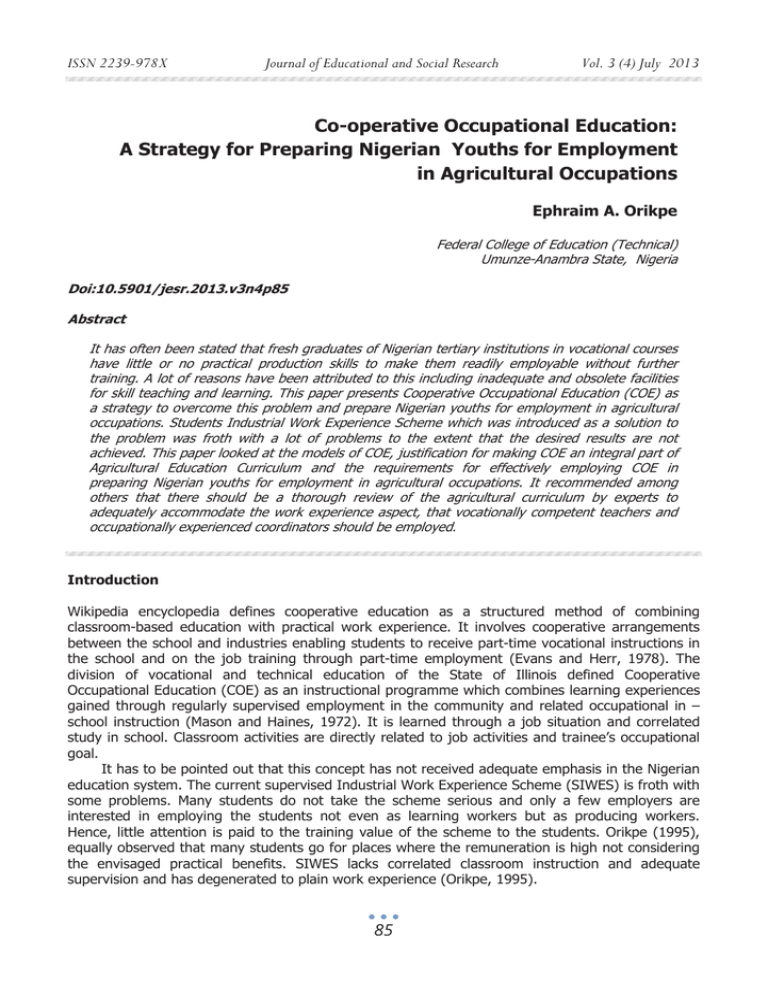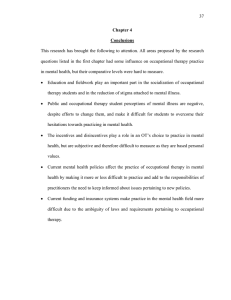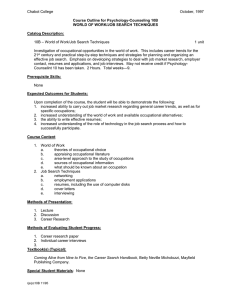Document 11961289
advertisement

ISSN 2239-978X Journal of Educational and Social Research Vol. 3 (4) July 2013 Co-operative Occupational Education: A Strategy for Preparing Nigerian Youths for Employment in Agricultural Occupations Ephraim A. Orikpe Federal College of Education (Technical) Umunze-Anambra State, Nigeria Doi:10.5901/jesr.2013.v3n4p85 Abstract It has often been stated that fresh graduates of Nigerian tertiary institutions in vocational courses have little or no practical production skills to make them readily employable without further training. A lot of reasons have been attributed to this including inadequate and obsolete facilities for skill teaching and learning. This paper presents Cooperative Occupational Education (COE) as a strategy to overcome this problem and prepare Nigerian youths for employment in agricultural occupations. Students Industrial Work Experience Scheme which was introduced as a solution to the problem was froth with a lot of problems to the extent that the desired results are not achieved. This paper looked at the models of COE, justification for making COE an integral part of Agricultural Education Curriculum and the requirements for effectively employing COE in preparing Nigerian youths for employment in agricultural occupations. It recommended among others that there should be a thorough review of the agricultural curriculum by experts to adequately accommodate the work experience aspect, that vocationally competent teachers and occupationally experienced coordinators should be employed. Introduction Wikipedia encyclopedia defines cooperative education as a structured method of combining classroom-based education with practical work experience. It involves cooperative arrangements between the school and industries enabling students to receive part-time vocational instructions in the school and on the job training through part-time employment (Evans and Herr, 1978). The division of vocational and technical education of the State of Illinois defined Cooperative Occupational Education (COE) as an instructional programme which combines learning experiences gained through regularly supervised employment in the community and related occupational in – school instruction (Mason and Haines, 1972). It is learned through a job situation and correlated study in school. Classroom activities are directly related to job activities and trainee’s occupational goal. It has to be pointed out that this concept has not received adequate emphasis in the Nigerian education system. The current supervised Industrial Work Experience Scheme (SIWES) is froth with some problems. Many students do not take the scheme serious and only a few employers are interested in employing the students not even as learning workers but as producing workers. Hence, little attention is paid to the training value of the scheme to the students. Orikpe (1995), equally observed that many students go for places where the remuneration is high not considering the envisaged practical benefits. SIWES lacks correlated classroom instruction and adequate supervision and has degenerated to plain work experience (Orikpe, 1995). 85 ISSN 2239-978X Journal of Educational and Social Research Vol. 3 (4) July 2013 Cooperative occupational education (COE) is based on the student’s stated career objectives and students are deployed as “learning workers” as distinct from SIWES that places trainees as “producing workers”. Unlike SIWES, COE is not usually open to any student without restrictions of experience of a selection process. Again, in SIWES, supervision is an extra assignment for a teacher with full – time teaching load. In COE, occupationally competent coordinators are employed to assist in providing adequate supervision and consistent programme direction. Models of Cooperative Occupational Education The purpose of co-operative occupational education programme is the development of occupational competence, using employment in real life job as a source for gaining knowledge as well as a vehicle for applying and testing what has been learned in school, (Mason and Haines, 1972). Class work in school provides those learning basic to employment and to the occupation sought. Grubb and Villeneuve (1995), pointed out that cooperative education has evolved into a programme offered at the secondary and post-secondary levels in two predominant models. In one model, students alternate a semester of academic course work with an equal amount of time in paid employment, repeating this cycle several times until graduation. The parallel method splits the day between school and work, typically structured to accommodate the student’s class schedule. Hence, the Cooperative Occupational Education model includes school – based and work-based learning. Basically, C.O.E.: Is based on the philosophy that learners lean best through active engagement in meaningful activities. Views student as active learners and producers of knowledge Uses such instructional strategies as contextual learning and application of knowledge to real situations Requires schools to establish formal partnerships with outside entities Has concern for integrating school experiences and external experiences. Justification for Making Cooperative Occupational Education an Integral Part of Agricultural Education Curriculum The use of farm enterprise related projects and on-farm cooperative occupational education will provide a sound foundation for establishment in farming. Agriculture has changed tremendously and in consequence too, the need of agricultural students has also changed. More new and specialized skills have to be learnt, practiced and mastered before students can establish farm businesses or become employable on the farm. Specialized employment areas requiring special training have emerged posing a challenge to the teachers of agriculture. Hence, the justification for making Cooperative Occupational Education is an integral part of Agricultural Education curriculum. Cooperative Occupational Education is a veritable tool to meet this challenge. However, there is need for proper planning, organization and development, supervision and operation, evaluation and revision. The proponents of this programme identify benefits for students (including motivation, career clarity, enhanced employability and vocational maturity) and employers (eg labour force flexibility, recruitment/retention of trained workers, input into curricula etc) (http://en.wikipedia.org/wiki/cooperative_education) Unemployment is currently posing a big challenge to the nation. Hence, cooperative occupational education can be used to prepare Nigerian youths who actually need and can profit from employment in agricultural occupations especially in this period of unprecedented unemployment and low agricultural productivity. It provides the student with a variety of experiences through job rotation. 86 ISSN 2239-978X Journal of Educational and Social Research Vol. 3 (4) July 2013 Agricultural education is a body of knowledge, skills, procedures for doing things and using things. It involves the total learning experience offered in an educational system which equips the learner with the skills, ideas, abilities to make matured judgments and be in a position to produce goods and services in the area of agricultural education (Okorie, 2012). There is need therefore for Cooperative Occupational Education to form an integral part of Agricultural Education Curriculum so that the gains will be consolidated. This is because, while Agricultural Education seeks to orient young Nigerians towards creative and honourable means of livelihood, Cooperative Occupational Education concretizes it. Through COE, the learner consolidates the learned skills, knowledge and competencies to the level of expertise. Equally worthy of note is the fact that Cooperative Occupational Education ensures career awareness, career exploration, career preparation and entrepreneurship development. The modern entrepreneurs need up-to-date technical knowledge and business skills. Since COE incorporates entrepreneurship into Agricultural Education, its introduction into the Agricultural Education programme is justified. As earlier stated, unemployment is a problem of tremendous proportion in Nigeria today and it results in a waste of manpower. Graduates of vocational courses are often seen as lacking skills, discipline and motivation necessary to acquire and hold jobs. However, adopting COE in agricultural education will help to reduce the unemployment problem since it increases a student’s vocational competence and helps to prepare him for employment in agricultural occupations. Many occupations in agriculture are best learned through Cooperative Occupational Education or else the learner will be left inadequately prepared for employment in the occupation of his choice. Through COE the students acquire better understanding of problem – solving and are able to test their occupational learning. Cooperative Occupational Education provides a gradual transition from school to work under guidance. The learners are gradually inducted into the world of work. Blomgren and Juergenson (2003) noted that in addition to technical ability acquired, trainees become familiar with the requirements and pressures of the world of work, current industry standards and conditions. Forster (2003) opined that COE is the real key for making the curriculum of vocational agriculture truly vocational. It equally helps handicapped youths to enter the labour force. There is therefore a serious justification for co-operative occupation education in agricultural education programme. Furthermore, COE is a better way to learn new skills and improve the student competency in agricultural occupations. Students are most likely to utilize classroom instruction to develop the entry level of skills commensurate with their career objectives. It will equally help to keep students abreast with new developments in agriculture. It provides an avenue for the application of classroom theory and the practice of demonstrated skills. Vocationalized agricultural curriculum place emphasis on the development of desirable skills and attitudes. This does not, however, mean that theoretical information is not required because a vocationalized agricultural curriculum is only effective to the extent that skills are developed on clear understanding of their theoretical foundations. Making COE an integral part of Agricultural Education curriculum is therefore justified. Requirements for Effectively Employing COE in Preparing Nigerian Youths for Employment in Agricultural Occupations/ Recommendations For Co-operative Occupational Education to successfully meet the needs of agricultural students for effective skill acquisition and self employment, the following conditions must be put in place: 1. There should be a thorough review of the agricultural curriculum by experts to adequately accommodate the work experience aspect. The review should conceive, define and present agricultural curriculum as a curriculum model that links work and academics – a model that is based on sound learning theory (Wilson, Stull & Vinsonhaler, 1996) and affirms the work – based learning principles upon which COE is based (Ricks, 1996). There should be a paradigm 87 ISSN 2239-978X Journal of Educational and Social Research Vol. 3 (4) July 2013 shift from content learning to greater understanding of learning processes, including reflection and critical thinking. 2. There should be suitable classroom facilities, instructional and practical materials adequate for effective occupational preparation. 3. Vocationally competent and professionally qualified teachers should be employed to provide the classroom teaching and supervision. This is important because, according to Lassa (1997), it is the teacher that lays the foundation of technological development in any country. He further stated that both the quality and the pace of technology advancement of a nation depend on the quality and efficiency of the teachers. Similarly, the success of COE starts with the quality and efficiency of the teachers. 4. Occupationally experienced coordinators should be employment to coordinate the employment learning experiences with the school learning experiences of the students. 5. The classroom agricultural instruction and the instruction at the training station should be based on the students career goals. This will help to make learning directional, meaningful and purposeful and will provide the needed motivation for learning to the students. Such instructions should be tailored to a set of definable performance objectives. 6. The employment situation must be truly a training station where the agro-industry or firm understands and accepts its teaching responsibility. Employers should be visited to determine the potentials of the site and the interest of the employer in the programme. They should be informed of the objectives of the programme. The responsibilities of each party should be clearly defined and avenues of communication established. 7. While working, each student should maintain a book or file of occupational records. The coordinator grades the book weekly or monthly to monitor the job performance of the students. This, in combination with the teacher’s evaluation and grades should be used to determine the students final grade. 8. There should be on – the – job supervision, training and guidance by an experienced supervisor appointed by the industry who will also monitor the students occupational progress. It is essential to maintain open communications between all parties with the teacher. 9. The guidance department of the school should be actively involved to ensure effective students scheduling and to assist with the administration of the programme. Through counseling, the students’ interest and abilities will be identified and they will be deployed more appropriately. Such counseling according to Orikpe (1994), should take cognizance of each student’s inclination so that the job chosen will provide a starting point for his future career. Moreso, to make a wise choice of vocation requires a clear understanding of the individuals self aptitudes, abilities, interest, ambition and conditions for success (Okorie and Ezeji, 1988). 10. Cooperative Occupational education should not be open to any student without restrictions of experiences of a selection process. Conclusion Without occupational experience programme, vocational agriculture will likely evolve to a “bookish mere classroom only experience with abstract applications” (Peterson & McCreight, 2003). The only way in which the occupational experience programme can find a permanent place in the agricultural programme of schools and colleges is for the work – based component to become so central to the educational purposes of the institutions that it becomes unthinkable to give it up. The Nigerian Third National Development Plan (1975 – 80) stated that employers claim that university and technical college education has little or no practical work content to make their fresh graduates readily employable. It becomes pertinent, therefore, to expose students of agriculture to cooperative occupational experience programme. This will help them to acquire the necessary skills that will enable them to establish and manage farms of their own or be employable in agricultural occupations. It will also expose them to the pressures of the world of work which will facilitate easy 88 ISSN 2239-978X Journal of Educational and Social Research Vol. 3 (4) July 2013 transition and adjustment to their work place. The assessment of student work performance as pursued by cooperative employers, can be used for continuous improvement of the curriculum (Cates & Cedaercreutz, 2008). As agriculture becomes more sophisticated and expands to related fields, trainees must acquire new and improved technical skills in order to keep abreast of inevitable changes, become easily employable and develop entrepreneurial skills. A better way to learn these new skills and improve their competency is to be actively involved in Cooperative Occupational Education. This will help to prepare Nigerian youths for employment in agricultural occupations by providing them with excellent work experience in their fields of study. It will show the employers that the graduates not only have the academic training and knowledge, but can also do the job. According to Ochu (1993), the subject matter content of agricultural education curriculum is adequate for academic training. What therefore remains is actualizing the occupational skill development objectives. Cooperative Occupational education is a sure strategy. It should therefore be accorded its pride of place in the curriculum schemata. This is more so because, it fosters self – directed learning, reflective practice and transformative learning; and integrates school and work learning experiences that are grounded in adult learning theories. References Blomgren, G. & Juergenson, E.M. (2003), Work Experience for Teachers; The Agricultural Education Magazine, iv, U.S.A. Cates, C. & Cedercreutz, K. (Ed) (2008), Leveraging Cooperative Education toGuide Curricular Innovation, The Development of a CooperativeFeedback System for Continuous Improvement, Cincinnati, Ohio: Centre for Cooperative Education Research and Innovation. Education (2nd Ed.) Columbus, Ohio: Evans, R.N. & Herr, E.L. (1978), Foundations of Vocational Charles E. Merill Publishing Co. Forster, R.M (2003), Supervised Occupational Experience – Not Just for High School; The Agricultural Education Magazine IV, U.S.A. Grubb, W.N. & Villeneuve, J.C. (1995), Cooperative Education in Cincinnati, Berkeley, C.A: National Centre for Research In Vocational Education. http://en.wikipedia.org/wiki/cooperative_education, ownloaded on 28/02/2013. Lassa, P.N. (1997), Entrepreneurship Education for socio-Economic and National Development in Nigeria, in Esomonu, N.P.M. (Ed.).Entrepreneurship Practices in Education; F.C.E.(T), Umunze: Research & Publication Unit. Mason, R.E. & Haines, P.G. (1972), Cooperative Occupational Education and Work Experience in the Curriculum. Illinois: The Interstate Printers and Publishers Ochu, A.O. (1993), An Assessment of the Effectiveness of the Senior Secondary School Agricultural Education Programme for Manpower Development in Nigeria. Journal of Teacher Education, 1 (2). Okorie, J.U. & Ezeji, S.C.O.A. (1988), Elements of Guidance, Vocational and Career Education. Onitsha:Summer Educational Publishers. Orikpe, E.A. (1995), Guidance and Counselling: A Missing Link in Supervised Industrial Work Experience Scheme (SIWES), in S.C. Eyibe (Ed.), Educational Administration, Planning and Supervision: Focus on Technology Education. Nigeria: TEWAN. Peterson, R.I & McCreight, M.G. (2003), Are Supervised Occupational Experience Programme Really that mportant? The American Education Magazine, IV. U.S.A. Ricks, F. (1996), Principles for Structuring Cooperative Education Programmes, Journal of Cooperative Education 31 (2-3): 8-22. Wilson, J.W.; Stull, W.A.; Vinsonhaler, J. (1996) Rethinking Cooperative Education, Journal of Cooperative Education 31 (2-3): 154-165. 89


